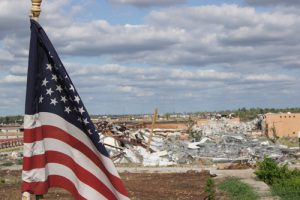
Disaster assistance reforms U.S. Rep. Dan Donovan (R-NY) recommended post-Hurricane Sandy’s federal funding bedlam received approval from the U.S. House of Representatives as part of the larger Federal Aviation Administration (FAA) overhaul.
The House on April 27 overwhelmingly approved the FAA Reauthorization Act of 2018, H.R. 4, sending it to the U.S. Senate for consideration. H.R. 4, introduced on April 13 by U.S. Rep. Bill Shuster (R-PA), included recommendations made earlier by Rep. Donovan that are aimed at clarifying and streamlining federal disaster recovery aid for Americans.
“The federal rules Congress and the agencies implemented after Sandy were terribly unfair to a lot of New Yorkers,” said Rep. Donovan. “Once this bill becomes law, no future disaster victim will be burdened with an SBA loan while others in the same situation get free grants.”
The congressman was referring to the ensuing federal funding chaos that followed 2012’s Superstorm Sandy, which killed at least 147 people in the Northeast United States, Canada and the Caribbean, according to the National Hurricane Center, and forced then-President Barack Obama to declare a state of emergency in six states and Washington, D.C. As one of the nation’s most-costliest tropical cyclones, Hurricane Sandy has required residents and the government to spend billions of dollars to cover massive expenses for repair, restoration and supplemental mitigation protection and prevention coverage.
According to a summary provided by Rep. Donovan’s staff, homeowners sought immediate individual funding relief for storm damage from the Federal Emergency Management Agency (FEMA). Once applicants exhausted such coverage, FEMA advised they apply to the U.S. Small Business Administration (SBA) for low-interest disaster recovery loans to help cover repairs and rebuilding costs. However, a secured SBA loan meant applicants simultaneously became ineligible for no-pay-back grants from the city’s Build It Back disaster recovery program funded by the U.S. Department of Housing and Urban Development (HUD).
Therein laid the resulting inequity problem, according to the summary. For example, two neighbors might have had the same amount of damage costing similar amounts, yet one received free Build It Back grant money while the other owed big on an SBA long-term loan.
“Congress should have fixed this problem back in 2012. Unfortunately they didn’t, and thousands of Sandy victims are now stuck with SBA loan debt that will take decades to repay,” Rep. Donovan said. “But with my measure, this won’t happen again.”
Rep. Donovan collaborated with local and federal officials on reforms that would prohibit SBA loans from making future disaster victims ineligible for recovery grants, according to his staff. The reforms also would require an overhaul of post-disaster environmental review regulations, an accounting of the costs associated with the current rules, and an analysis of how multiple federal agencies could streamline the application process, according to the staff’s summary.
“Ronald Reagan quipped that ‘there’s no limit to the amount of good you can do if you don’t care who gets the credit,’” Rep. Donovan said on May 2. “The reforms I helped pass … came from months of conversations. Plenty of folks deserve some credit.”
Staten Island Borough President James Oddo and former HUD Regional Administrator Holly Leicht are two of those people, said Donovan, who thanked them “for working with me to get this done.”
In fact, the congressman’s provisions included in H.R. 4 resulted from their collaboration. Borough President Oddo’s office funded an analysis of the Superstorm Sandy recovery by Leicht, who upon completion of the study made several recommendations.
Rep. Donovan and his staff shared those recommendations during multiple conversations with the U.S. House Transportation and Infrastructure Committee, which oversees large portions of disaster recovery. Based on their conversations, the committee included the Donovan-Oddo-Leicht recommendations in the House-approved H.R. 4.
“The ‘recovery’ after the storm should not be more painful and cause more heartache than the storm itself. Sadly, that is what many Staten Islanders experienced after Sandy,” Oddo said in a joint statement released this week with the congressman.
Oddo added that “mistakes were made early, made often, were compounded, and were repeated. Our government has to be better across the board in the future. These improvements are a tangible improvement in that direction.”



